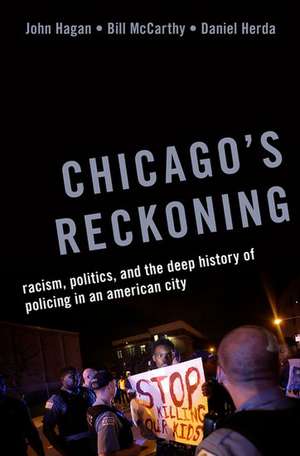Chicago's Reckoning: Racism, Politics, and the Deep History of Policing in an American City
Autor John Hagan, Bill McCarthy, Daniel Herdaen Limba Engleză Hardback – 16 aug 2022
Preț: 166.29 lei
Preț vechi: 200.45 lei
-17% Nou
Puncte Express: 249
Preț estimativ în valută:
31.83€ • 34.59$ • 26.75£
31.83€ • 34.59$ • 26.75£
Carte disponibilă
Livrare economică 20-26 martie
Preluare comenzi: 021 569.72.76
Specificații
ISBN-13: 9780197627860
ISBN-10: 0197627862
Pagini: 248
Dimensiuni: 251 x 165 x 25 mm
Greutate: 0.52 kg
Editura: Oxford University Press
Colecția OUP USA
Locul publicării:New York, United States
ISBN-10: 0197627862
Pagini: 248
Dimensiuni: 251 x 165 x 25 mm
Greutate: 0.52 kg
Editura: Oxford University Press
Colecția OUP USA
Locul publicării:New York, United States
Recenzii
Chicago's Reckoning expertly lays bare the disturbing reality that America's racialized politics of policing and crime are rooted in the continued segregation of African Americans, not only in Chicago but in ghettoized cities throughout the nation. Its masterful analysis trenchantly explains how segregation underlies a tightly coupled system of racial exclusion and containment to sustain mass incarceration and entangle Blacks and Whites within a dysfunctional culture of legal cynicism that benefits neither group and poisons all of American society.
Chicago's Reckoning provides a searing account of police brutality, political cover-up, and the deep disappointment of Black and Brown communities in a system that fails to provide for their safety. Everyday abuse and misconduct by police, concealed and denied by Chicago's political leaders, unfolded in a segregated city that left many young Black men unprotected and fending for themselves. Hagan, McCarthy, and Herda's urgent analysis shows that justice will depend not just on transforming the police, but also the political establishment and racial inequality in which it is embedded.
Chicago's Reckoning is impressive. I have rarely seen any scholarship that weaves together historical, political, quantitative, cultural, and cognitive analysis in such a thorough and convincing way.
Chicago's Reckoning rewrites our sociological understanding of power, corruption, crime, and culture. The authors weave together an unprecedented range of data with Studs Turkel-like storytelling to reveal how Chicago's political machine brutally leveraged criminal law to simultaneously advance the agenda of the White political elites while also excluding and containing Black neighborhoods. Understanding a neighborhood's history of exclusion and containment, the authors argue, should be a central explanatory mechanism in any theory of urban inequality.
Chicago's Reckoning provides a searing account of police brutality, political cover-up, and the deep disappointment of Black and Brown communities in a system that fails to provide for their safety. Everyday abuse and misconduct by police, concealed and denied by Chicago's political leaders, unfolded in a segregated city that left many young Black men unprotected and fending for themselves. Hagan, McCarthy, and Herda's urgent analysis shows that justice will depend not just on transforming the police, but also the political establishment and racial inequality in which it is embedded.
Chicago's Reckoning is impressive. I have rarely seen any scholarship that weaves together historical, political, quantitative, cultural, and cognitive analysis in such a thorough and convincing way.
Chicago's Reckoning rewrites our sociological understanding of power, corruption, crime, and culture. The authors weave together an unprecedented range of data with Studs Turkel-like storytelling to reveal how Chicago's political machine brutally leveraged criminal law to simultaneously advance the agenda of the White political elites while also excluding and containing Black neighborhoods. Understanding a neighborhood's history of exclusion and containment, the authors argue, should be a central explanatory mechanism in any theory of urban inequality.
Notă biografică
John Hagan is John D. MacArthur Professor of Sociology and Law at Northwestern University and the American Bar Foundation and author of numerous books including Iraq and the Crimes of Aggressive War, Reclaiming Justice, and Who Are the Criminals? Bill McCarthy is the Dean of Rutgers Newark School of Criminal Justice and Professor Emeritus of Sociology at the University of California Davis. He is co-editor of The Oxford Handbook of Gender, Sex, and Crime, with Rosemary Gartner, and co-author with John Hagan of Mean Streets: Youth Crime and Homelessness. Daniel Herda is Associate Professor and Chair of Sociology at Merrimack College and author of papers in Social Forces, Social Science Research, and Ethnic and Racial Studies.
